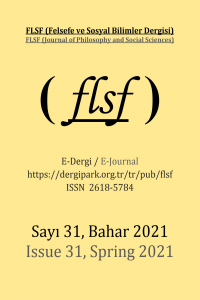Abstract
Bu çalışma Theodor W. Adorno’nun Jargon der Eigentlichkeit, zur Deutchen Ideologie (Sahicilik Jargonu, Alman İdeolojisi Üzerine) ve Negative Dialektik (Negatif Diyalektik) kitapları çerçevesinde Martin Heidegger’in “Varlık” ve “Dasein” kavramlarına yönelttiği eleştirilere odaklanmaktadır. Burada öncelikle Adorno’nun, Edmund Husserl’in fenomenolojisine dair eleştirisi genel hatlarıyla özetlenmeye çalışılacaktır. Ona göre fenomenolojik okul kendini idealizm geleneğinden kurtarmaya çalışmasına rağmen bunda başarılı olamamıştır. Aynı şekilde Heidegger’in fundamental ontolojisi de içinde idealizm geleneğinin izlerini taşımayı sürdürmektedir. Bunun yanında Heidegger, felsefesinde kullandığı jargon nedeniyle çağının otoriter ideolojisini de yansıtır. Bu nedenle Adorno, fundamental ontolojinin içsel bir eleştirisini yaparak bu felsefe ile ideoloji arasındaki bağları göstermeye çalışmıştır.
Keywords
References
- Adorno, Theodor W., Neden Hala Felsefe, (çev. Ali Kaftan), Cogito No. 36 içinde, Yapı Kredi Yayınları, İstanbul, 2003.
- Adorno, Theodor W., Sahicilik Jargonu Alman İdeolojisi Üzerine (çev. Şeyda Öztürk), Metis Yayınları, İstanbul, 2015.
- Adorno, Theodor W., Negatif Diyalektik. Çev. Şeyda Öztürk. Metis Yayınları, İstanbul, 2019.
- Adorno, Theodor W., Husserl ve İdealizm Problemi (çev. Evrim T. Somyürek, Kurtul Gülenç, Aşkın İ. Duru), içinde Varoluşçuluk, Fenomenoloji, Ontoloji (ed. Güçlü Ateşoğlu). Ayrıntı Yayınları, İstanbul, 2020.
- Dallmayr, Fred R., Fenomenoloji ve Eleştirel Kuram: Adorno (çev. H. Emre Bağce), içinde Frankfurt Okulu (ed. H. Emre Bağce). Doğu Batı Yayınları, Ankara, 2019.
- Hegel, G. W. F., Mantık Bilimi (Büyük Mantık), (çev. Aziz Yardımlı), İdea Yayınevi, İstanbul, 2014.
- Heidegger, Martin, Varlık ve Zaman. Çev. Kaan H. Ökten. Alfa Yayınları, İstanbul, 2018.
- Heidegger, Martin, Metafizik Nedir?, (çev. Yusuf Örnek), Türkiye Felsefe Kurumu, İstanbul, 2009.
- Horkheimer, Max, Geleneksel ve Eleştirel Kuram, (çev. Mustafa Tüzel), Yapı Kredi Yayınları, İstanbul, 2005.
- Miller, Jared A., Phenomenology’s Negative Dialectic: Adorno’s Critique of Husserl’s Epistemological Foundationalism, içinde The Philosophical Forum 2009, 40(1) (ss. 99-125). DOI: 10.1111/j.1467-9191.2008.00317.x
- Ökten, Kaan H., Varlık ve Zaman: Bir Okuma Rehberi, Alfa Yayınları, İstanbul, 2019.
- Serin, İsmail, Adorno’nun Bilgi Kuramı Eleştirisinde Husserl Fenomenolojisinin Yeri, Kilikya Felsefe Dergisi, 2020, No. 1 içinde, (ss. 102-109)
Abstract
This study focuses on Theodor W. Adorno's criticism of Martin Heidegger's "Being" and "Dasein" concepts within the framework of the books Jargon der Eigentlichkeit, zur Deutchen Ideologie (The Jargon of Authenticity, on German Ideology) and Negative Dialectic (Negative Dialectics). In the beginning, Adorno's criticism of Edmund Husserl's phenomenology will be summarized in general terms. According to him, although the phenomenological school tried to free itself from the tradition of idealism, it did not succeed in this. Likewise, Heidegger's fundamental ontology continues to bear the traces of the idealist tradition in it. In addition, Heidegger reflects the authoritarian ideology of his age, due to the jargon he uses in his philosophy. Therefore, Adorno has attempted to show the links between fundamental ontology and ideology by making an internal critique of this philosophy.
Keywords
References
- Adorno, Theodor W., Neden Hala Felsefe, (çev. Ali Kaftan), Cogito No. 36 içinde, Yapı Kredi Yayınları, İstanbul, 2003.
- Adorno, Theodor W., Sahicilik Jargonu Alman İdeolojisi Üzerine (çev. Şeyda Öztürk), Metis Yayınları, İstanbul, 2015.
- Adorno, Theodor W., Negatif Diyalektik. Çev. Şeyda Öztürk. Metis Yayınları, İstanbul, 2019.
- Adorno, Theodor W., Husserl ve İdealizm Problemi (çev. Evrim T. Somyürek, Kurtul Gülenç, Aşkın İ. Duru), içinde Varoluşçuluk, Fenomenoloji, Ontoloji (ed. Güçlü Ateşoğlu). Ayrıntı Yayınları, İstanbul, 2020.
- Dallmayr, Fred R., Fenomenoloji ve Eleştirel Kuram: Adorno (çev. H. Emre Bağce), içinde Frankfurt Okulu (ed. H. Emre Bağce). Doğu Batı Yayınları, Ankara, 2019.
- Hegel, G. W. F., Mantık Bilimi (Büyük Mantık), (çev. Aziz Yardımlı), İdea Yayınevi, İstanbul, 2014.
- Heidegger, Martin, Varlık ve Zaman. Çev. Kaan H. Ökten. Alfa Yayınları, İstanbul, 2018.
- Heidegger, Martin, Metafizik Nedir?, (çev. Yusuf Örnek), Türkiye Felsefe Kurumu, İstanbul, 2009.
- Horkheimer, Max, Geleneksel ve Eleştirel Kuram, (çev. Mustafa Tüzel), Yapı Kredi Yayınları, İstanbul, 2005.
- Miller, Jared A., Phenomenology’s Negative Dialectic: Adorno’s Critique of Husserl’s Epistemological Foundationalism, içinde The Philosophical Forum 2009, 40(1) (ss. 99-125). DOI: 10.1111/j.1467-9191.2008.00317.x
- Ökten, Kaan H., Varlık ve Zaman: Bir Okuma Rehberi, Alfa Yayınları, İstanbul, 2019.
- Serin, İsmail, Adorno’nun Bilgi Kuramı Eleştirisinde Husserl Fenomenolojisinin Yeri, Kilikya Felsefe Dergisi, 2020, No. 1 içinde, (ss. 102-109)
Details
| Primary Language | Turkish |
|---|---|
| Subjects | Philosophy |
| Journal Section | Research Article |
| Authors | |
| Publication Date | May 12, 2021 |
| Submission Date | February 10, 2021 |
| Acceptance Date | April 4, 2021 |
| Published in Issue | Year 2021 Issue: 31 |
Starting from 2024, our journal will be published in 3 issues as two regular and one special issues. These issues will be published In May (regular issue), September (special issue) and December (regular issue).
Only articles within the scope of the file will be included in our special issue.
Thank you for your attention.

